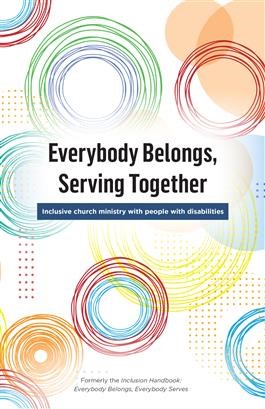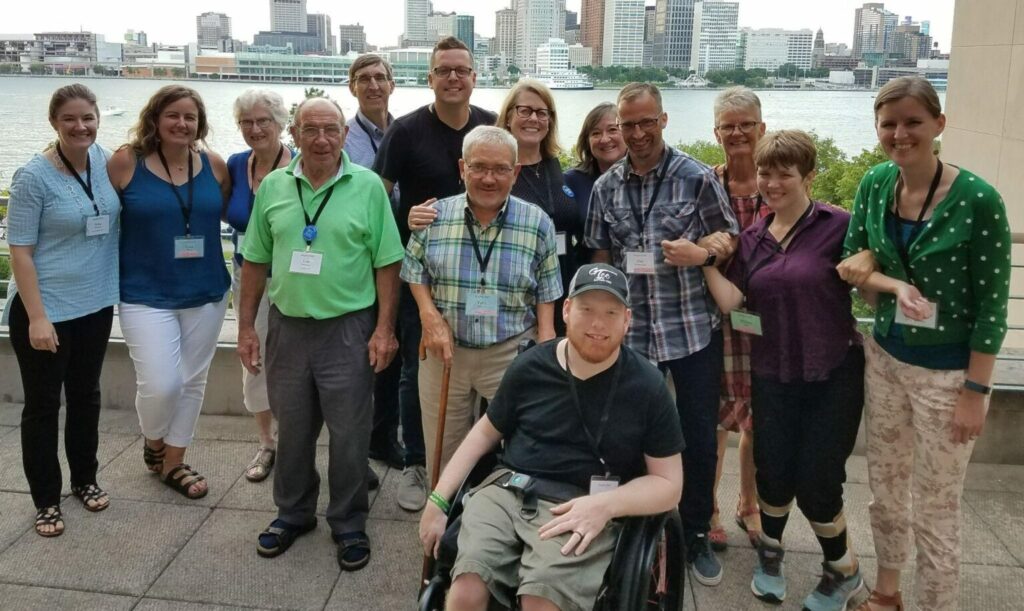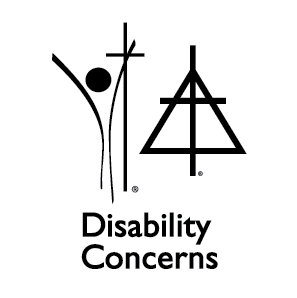Oct 21, 2021
The Situation

The Disability Concerns Ministry is an agency of the Christian Reformed Church in North America (CRCNA). It oversees the work of both local and regional church disability advocates throughout Canada and the US. These important volunteer roles work to create inclusive churches that welcome and engage people with disabilities. Both local and regional roles needed to be given more of a definition as well as goals for consistency and accountability within the volunteer task force.
There were three needs to address:
- Becky Jones (the client) was new in her role and wanted skills in program and learning design.
- The existing orientation program needed a central archival space and a comprehensive course.
- The orientation resources needed to be reviewed, revised, and reconsidered to ensure they were current, consistent, and clear.
The Disability Concerns ministry of CRCNA was just finishing a revised manual for churches called Everybody Belongs, Serving Together. This new training will accompany and complement the work church advocates are doing to achieve the goals of an inclusive church ministry with people with disabilities.
GLP has a 25 year history with CRCNA and collaborated with multiple ministries and agencies including World Renew, ServeLink, Diaconal Ministries, Race Relations, Indigenous Ministries, Office of Social Justice, Center for Public Dialogue, Raise Up, Timothy Leadership Training Program, and Global Coffee Break. Through this rich history of collaboration we have built a relationship of trust and mutual respect. We were excited to continue this with Disability Concerns.
The Journey
With the client mandate and needs listed above, the goals were clear:
- To train Becky Jones in designing trainings and other learning events (GLP worked to teach skills in design and use)
- To develop a rigorous, learning-centered orientation program for the volunteer Disability Concerns Advocates
- To centralize all resources for Disability Concerns Advocates, ensuring they are current and helpful
The newly developed Disability Concerns Volunteer orientation program now includes the following nine robust lessons:
- The Learning Journey
- Getting to Know Your Role
- Expectations and Responsibilities
- Getting Connected to the Ministry
- Receiving Support in Your Role
- Defining Your Goals
- Making it Real
- Getting to Know about Church Advocates
- Facilitating Trainings and Gatherings
There were two main challenges to work through:
CHALLENGE 1 – How to offer an engaging training through a self-paced course
- Provide prompts for a learning journal. Everyone is asked to use a blank journal to record learning through thoughtful prompts and make connections for future work.
- Offer examples from past trainings and guidance. Disability Concerns has a treasure trove of videos and articles by experienced staff and volunteers. Using these allowed for continuity and drew on the wealth of experience from current and previous advocates.
- Kick off each module with an engaging video from the lead trainer. These introductory videos set the stage and offered explanations for why each module was an important part of the whole.
- Design shorter modules. Each of the nine modules contains limited content. This allows an easier pace for volunteers doing it on their own and helps guard against training burnout.
- Share a learning-centered approach. The entire course was designed using a learning-centered approach. In the final module we also teach about this approach to help advocates facilitate and adapt their own trainings.
CHALLENGE 2 – How to ensure the online orientation is inclusive for all volunteers
- Select a ‘stripped down’ Learning Management System (LMS). Although there are many LMS’s that offer tools, tricks, and techniques for designing complex and fun engagement, these would have excluded many special needs volunteers, i.e. sight challenged. We ensured engagement in ways other than with the technology.
- Ensure the LMS allows for both written and audio cues. Some volunteers will need to rely solely on the visual text and others on the audio text.
- See the volunteers as key resources in this project. They know how they best need to receive information. Further, DC wanted to model how to assess needs for full inclusion. Regular meetings were arranged throughout the development of this project.

The Hope
This new learning initiative will be launched in the Fall of 2021. Although evidence of the impact is not yet available, the hopes for this self-paced learning program are:
- Regional Advocates have a clearer definition of expectations within the role they are agreeing to.
- Regional Advocates are more confident facilitators and designers of events, and use a collection of tools for these events.
- Regional Advocates and the Disability Concerns Ministry have a shared language, focus, and tools for their work.
- Churches are clearer about the value of Disability Concerns Ministry and more easily encourage volunteer participation.
- Volunteers are clearer about to whom they should reach out for support.
- Staff and volunteers have clearer levels of accountability for flow of information and networking.
- The ministry is growing in a more balanced and effective way.




